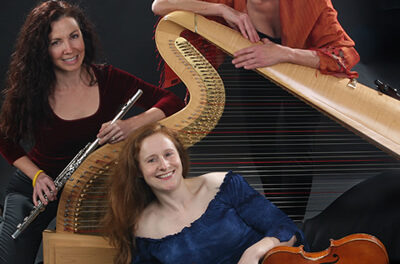Yelena Eckemoff, composer/pianist. http://www.YelenaMusic.com/
Talent Hidden in Small, Unexpected Places
Who would have thought that a Moscow Conservatory-trained pianist and composer might be found living in the small town of Blanch, NC, in Caswell County, near the Virginia line? That is precisely where Yelena Eckemoff has chosen to live with her family, where she also paints and tends her garden. Although she might well have pursued a career on the world’s concert stages, she chose a different path, not always without difficulty and setbacks.
For a day job, she is organist and choir director of a Methodist church and teaches privately. The inspiration for many of her compositions has come from her faith, and her job has also provided an opportunity to have some of her works heard. She also works with MIDI files to produce her own recordings in the studio that her husband built for her, and she markets them directly at http://www.YelenaMusic.com/ or through http://www.Amazon.com/. Like most composers and performers, she admits to constantly evolving and improving, and to working at doing both.
Eckemoff grew up in Russia in a musical family; her mother, also a pianist, was her first teacher. She entered the Gnessin Music School at the age of seven, as a pupil of Anna Pavlovna Kantor, whose most famous pupil is Evgeny Kissin. From there she went to the Moscow State Conservatory piano school, but in the end she felt restricted by its constraints and ultimately set out on her own path. She married and had three children, and with her husband decided to emigrate to the US in 1991. It took them fourteen months to get their children here. They became citizens in 2000.
Variety and eclecticism are words that spring to mind to describe her output. She has a pair of CDs of standard repertoire short works, entitled “Piano Series,” that demonstrate her impeccable classical performance credentials. She has a pair of CDs entitled “Piano Chronicles” that feature two sets or suites each of her own short compositions written over the years, beginning in her teens and running up to age 40, and arranged chronologically. These pieces are primarily Romantic in style, with some deriving more from the realms of jazz and “New Age,” but they are not true cycles. Their accompanying booklets feature photos, likewise spanning the years, that have a distinct charm. Brief texts describing the individual pieces and their inspirational sources would be most welcome and would improve the whole package immensely, too. A third CD in this most interesting series, to be named “The Call,” is in the works.
There is a CD entitled “Kaleidoscope of Life” that grew out of the activities of daily living in Eckemoff’s house and garden and uses background noises associated with them along with the piano. There is a seasonal Christmas CD featuring original arrangements of traditional songs and carols. There is a pair of CDs inspired by the Biblical narratives of the two major events of the Christian year, “The Birth of Emmanuel” and “The Resurrection of Jesus Christ.” Both include readings from the King James Version of the Gospel According to St. Matthew, the former with the verses interspersed and the latter, with them separate at the end (to this listener, a much less satisfactory solution).
Finally, there is a pair of cassettes of Psalm settings, again using the King James Version, sung by Burlington soprano Charlene Smith. Especially considering that English is not Eckemoff’s native tongue, she is to be commended for her selection of this the most poetic translation of the scriptures and for her skill in following and supporting the textual lines with the musical ones. She is reworking these for re-recording on CD rather than making simple transfers, adding cello to some, with the goal of increasing the variety of the interpretations.
Inevitably, especially with the music of religious inspiration, there is a certain feeling of repetitiveness, almost the same that some works by minimalist composers have. Some of the music also has more of a “New Age” feel than the average Classical music listener would expect or want, as Eckemoff herself says, so there is no misleading here. Different listeners will react differently, but their musical foundation and inspirational validity cannot be denied any more than the mastery of the performances themselves can be. Technically, some of the recordings are better than others; the “Kaleidoscope” strikes this listener as the least successful of the lot, along with the actual recording aspect of the Psalm settings, which are being re-worked as noted above. Eckemoff is also working to improve the booklets, making them more thorough and professional. Scores of her music are not published in the usual understanding of that term; they exist, however, in written form, so that other musicians interested in performing the works could do so by arrangement directly with Eckemoff.











